September 19th, 2017 — 5:11pm
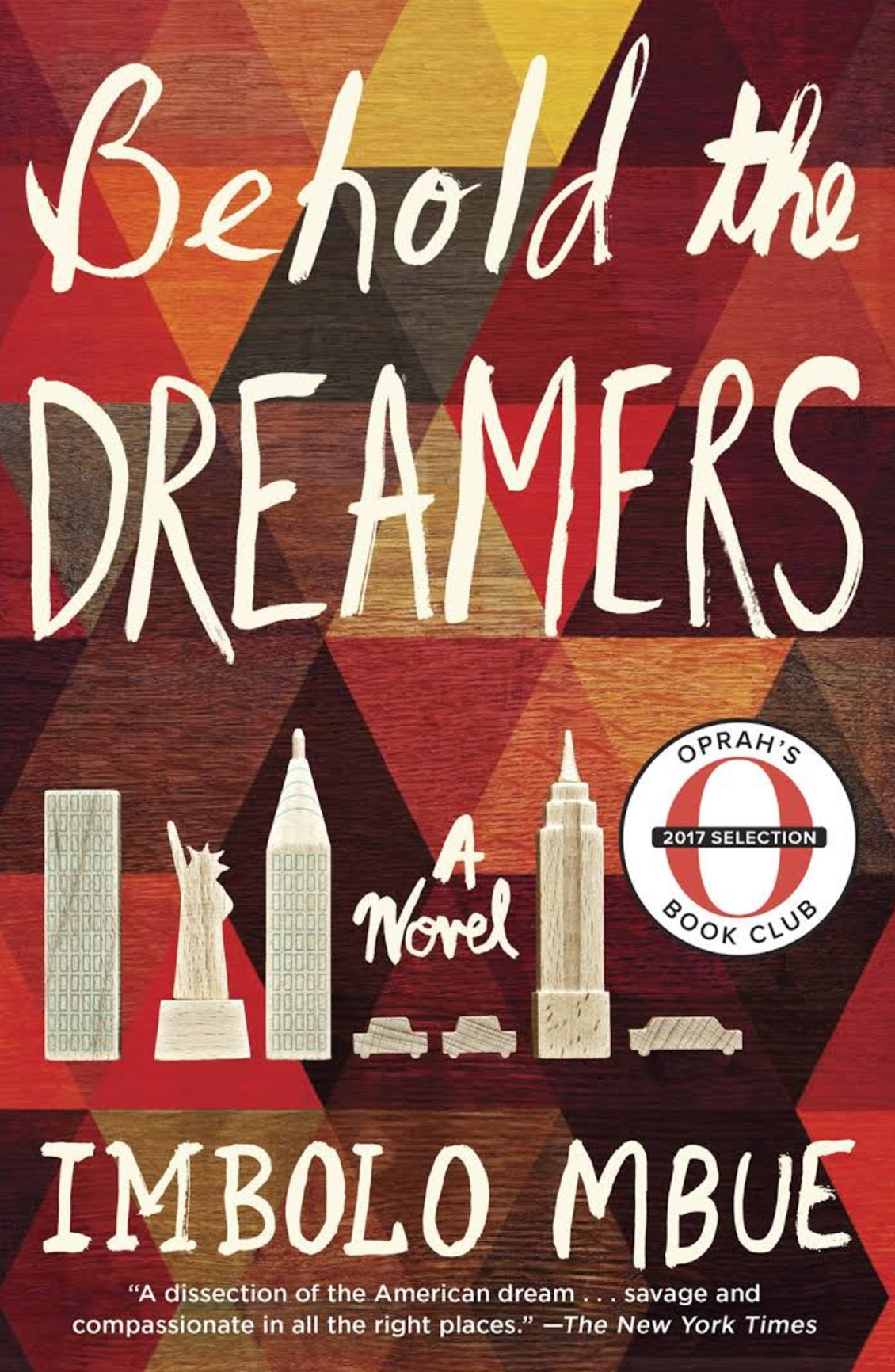 Behold the Dreamers
Behold the Dreamers
By: Imbolo Mbue
There could not be a more pertinent book to read during the time period that I read this book. The immigration issue, DACA and related subjects are front and center in the current political discussions.
Imbolo Mbue has obviously had some very personal experiences depicted in this book about immigrants struggling to be able to stay in the United States and not be deported. This is the plight of the two main characters, Jende and Neni, a married couple from Cameroon in Africa now living in New York City and having two children. He works as a chauffeur for a wealthy businessman and Neni, his wife, takes care of the children and works, and is studying to be a pharmacist. They have a flimsy story as to why they should be allowed to stay in the United States and they are living from court date to court date with tremendous anxiety whether or not they will be deported.
There is a very engrossing storyline that makes a great drama as well as informing us of the nature of the relationship between these struggling immigrants. We come to understand the legal intrigues as well as the most personal feelings that may be experienced by people going through this situation.
The writing is excellent, although I had one complaint with the author’s style and format. During several points in the story, I was totally engrossed and on the edge of my seat swiping page after page on my iPad when the author adds a chapter that goes back in time in order to help develop the character or provide background information. I personally found that a distraction and wish she could have found another method to achieve her goal of enlightening the reader with more background.
I came away from this book with a new and deeper appreciation of the current immigration crisis. But really, as moving as this story, it is obviously a tale of only one couple and their individual story struggling for the right to stay in the United States. There must be thousands of other scenarios and I feel we have only scratched the surface but nevertheless it was a worthwhile experience.
Please leave any comments below
To purchase this book from Amazon, please click here.
Comment » | FG - Fiction General, P - Political
August 19th, 2017 — 10:55am
How It All Began by Penelope Lively
I must confess that circumstances led me to read this book over a more prolonged period of time than usual. I believe my appreciation for the story suffered because of this. The premise of this book is that events that occur in one person’s life will influence and even change the course of the life of another person which will impact and change the course of still another individual and so on and so on. The seminal event from the author’s point of view in this story was the mugging of an elderly woman which caused her to have a broken hip which led her to move in with her daughter and son-in-law which caused her daughter to take off from work and then brought about changes in the trajectory of other people. Needless to say there were events which led the woman and her mugger to cross paths which were not explained in this book
As I mentioned earlier, I didn’t quite get with the flow of the story but I did appreciate the engaging style of writing of Ms. Lively. The story of each person might very well have been developed into an interesting novel itself. However, from my point of view, the overall experience of this novel was not a satisfying one.
To purchase a copy of this book on Amazon, please click here.
Comment » | FG - Fiction General
June 29th, 2017 — 11:44pm
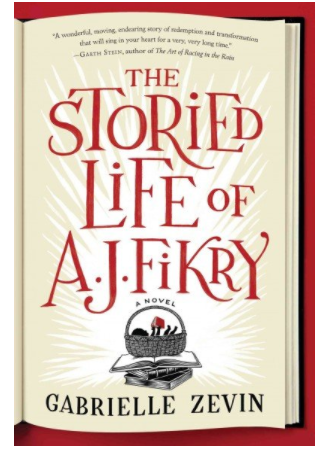 The Storied Life of A.J. Fikry by Gabrielle Zevin
The Storied Life of A.J. Fikry by Gabrielle Zevin
This book as the title suggests is about books and people who love them and love each other.
The story takes place mostly on Alice Island, a small island off the coast of New England. In reality there is no such place but it reminds me of Martha’s Vineyard or Nantucket. On this island there is a book store owned and run by a middle-aged man A.J. Fikry who had suffered the premature death of his wife. He also has had the unusual experience of having a woman who he did not know, leave her two year old in his bookstore before she ended her own life by walking into the ocean. Unexpectedly, he decided to adopt this infant and raise her. There is one more event necessary to set the scene for this novel and that is the appearance of Amelia, the new representative from a publishing company whose job would be to periodically a few times a year take the ferry to Alice Island where she would interact with the owner of the bookstore about new book releases. There is chemistry between A.J. and Amelia but there doesn’t seem to be an easy way for them to blend their lives.
There are other important characters in this book including Ismay, the sister of A.J.’s departed wife and Lambiase, a local police officer who falls under the spell of books and this bookstore.
There is an important concept in psychiatry called psychic determinism, meaning that all things are determined by events that occurred in the past. Our lives are altered by our interactions with various people, places and events. There are obviously an infinite number of examples how the existence of one element might change many lives. In this case we come to appreciate how this one bookstore and many of the people who came through its doors were altered and determined.
While I did enjoy this novel I also felt that I missed a good deal of appreciating the depth of it because there were many references to books that I have not read. In fact, each chapter started off with a reference to a classic story, which I am sure added to the enjoyment by those who read and remembered that book.
Finally, this novel also provided a reminder of how modern technology may be changing the bookstores of the world forever. At one point in the novel, A.J.’s mother appeared with gifts for adults and the child which consisted of E-readers. A.J. understandably didn’t like the idea of such a gift. We read this novel on an E-reader and we are little sad to say that we don’t know if we will find a reason to set foot in a bookstore again. Unlike the situation in this novel where book clubs were held in the bookstore, our own book club takes place in our members’ homes. This novel may very well end up belonging to the category of historical novels.
To purchase a copy of this book on Amazon, please click here
Comment » | FG - Fiction General
June 20th, 2017 — 1:27pm
Septembers of Shiraz by Dalia Sofer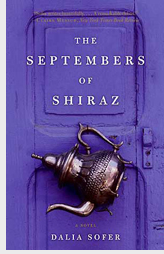
A successful, happily-married jeweler, father of two children, is in his store in Tehran, Iran, when he finds a man pointing a rifle at him and saying, “We’re here by orders of the Revolutionary Guard.” The year is 1979 and the Shah and monarchy of this country has been toppled.
As we get into this well-written historical novel, we find it very easy to identify with the members of this family, as well as with their hopes and aspirations. We can put ourselves in their shoes and relate to the father, Isaac, his wife, Farnaz, and their two children. It was only when their world was turned upside-down by Isaac being led away for interrogation and stay in prison of which his release was possible but so was execution, that we were entering into an unimaginable set of circumstances. The difference between his life and death while in captivity might be whether he would reveal information about “questionable” relatives or friends who may have supported the toppled shah or his government in any way. What would we have done?
From time to time we meet people who were born in Iran or their parents were born there, but we never imagined what they may have experienced. We probably know more about the Holocaust having spoken with or heard accounts by survivors in real life or from books and movies. There was one account in this book describing an Iranian man who had escaped to the United States and was a successful florist. It was revealed that the man had been a well-known university cardiologist in Iran before he was forced to leave in order to survive. Once in the United States, he couldn’t imagine going back to school and trying to get credentials and certifications to become a doctor again. So, he put his energy and creativity to becoming a successful florist. Once again, we think, what would we have done? Or perhaps the lingering question is could we have done what most of the characters in this book have done?
This book is apparently inspired by some actual experiences by the author as well as some understanding into what members of her family have gone through. The book is well-written. It serves not only as an insight of the history, but also as a solid description of family relationships and family psychodynamics. I highly recommend this it.
To obtain a copy of this book please click here
Comment » | FG - Fiction General, HI - History, P - Political
February 6th, 2017 — 3:29pm
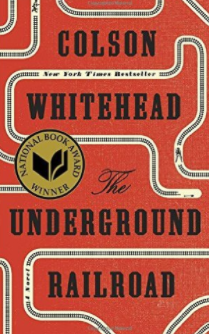 As any student of US history would know, there was not an actual “underground railroad” where slaves could ride a train and escape to the north or to the west where they could be free. Rather the term was used for men and women, black and white who risked their lives and developed an “underground” network where fleeing Blacks could be hidden and sheltered as they sought to be free of slavery and oppression that existed in this country.
As any student of US history would know, there was not an actual “underground railroad” where slaves could ride a train and escape to the north or to the west where they could be free. Rather the term was used for men and women, black and white who risked their lives and developed an “underground” network where fleeing Blacks could be hidden and sheltered as they sought to be free of slavery and oppression that existed in this country.
Colson Whitehead, the author of this book turns this metaphor into an actual train which would have the potential to ferry people to freedom. However, the very clear message of this book is that there was essentially no pathway to freedom in our country during this shameful period of US history. We see not only for slavery in the cotton fields and other areas of hard labor but also domestic slavery in the most “genteel” homes. We are reminded of the historical truth of the “breeding” of slaves, since children who grew into adult slaves had monetary value to their “owners.” There can be no denial of the brutal treatment of black slaves who were beaten and raped at will. The concept of so-called “ownership” of another person is explored at length in this book as we are introduced to the “slave catchers”. These are people who chase and trace slaves and bring them back to their “owners” for a large reward (often plus “expenses”). These bounty hunters have no border restrictions and were free to do their work in any part of the United States. As we were reminded of in the outstanding book and movie “12 Years a Slave” there were no safe zones in any part of the United States even in New York and in New England. Perhaps there were some so-called “black freemen” in some states but in additional to prejudice and discrimination which they faced, there was always the possibility of being kidnapped and sold into slavery.
As is often the case with a great novel, the author tells his or her story through the eyes of one or more characters. There were several people in the book who gave this reader the opportunity to understand their experiences. Most meaningful to me was to inhabit Cora, a young black girl who eventually “rode the railroad” and her mother Mabel, who abandoned Cora at a young age and made her attempted run for freedom.
Then there is the question of what would I do if I lived in that period and have the opportunity to hide a fleeing slave or perhaps a persecuted Jew in Nazi Germany, and in both cases knowing that if I were discovered it would mean death to me and my family. The author allows us to get some insight into such people who chose to be part of the “underground railroad”.
To obtain a copy of this book from Amazon, please click here
Comment » | FG - Fiction General
October 13th, 2016 — 2:19pm
A Man Called Ove by Fredrik Backman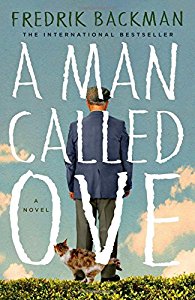
This is a Swedish book all about a man who could be described as a “crabby old man…curmudgeon…angry…stubborn…etc..” He doesn’t seem to like new technology such as the Internet. He only buys Saab automobiles. He seems fixed in his ways. Now older people are known to gravitate towards these characteristics. (So I have been told) But wait, he really wasn’t that old. It was mentioned a few times that he was 59 years old. Maybe this is all relative or perhaps the author was fairly young when he wrote this book. (I was able to determine that he was 32 years old when the book was published)
As the book progresses, especially through various gravesite one way conversations with his deceased wife we learn about the very close relationship he had with her during their 40 years of a childless marriage in which they both seemed to be very happy. We see that beneath it all Ove is a caring person who will teach a pregnant neighbor to learn how to drive, build her a crib for her expected child, relate to a young kid next door and have some very endearing characteristics although hidden under his gruff surface. There is also a part of him that can’t find the reason to live and seemed determined to carry out a neatly organized suicide. We can even empathize with him especially when we see that he clearly believes he will be reunited with his beloved wife.
The main character did hold my interest but overall this book was not a page turner for me.. The success of this book, I believe is to the degree in which the reader relates to Ove and finds important characteristics in him with which to self-identify. In the case of women, I imagine if they would have to recognize in him certain traits of the men that they love. I personally could indentify with someone who cares more than he overtly shows it. Perhaps that is a guy thing. Then there is the issue that his wife really understood him and now that she was gone, he had to find a way to hold on to her. The book certainly did not have a complicated plot. We were not taken to exotic places or given unusual dilemmas. I could only hope that the pending movie can raise the pulse of this story.
To obtain a copy of this book, please click here
Comment » | FG - Fiction General
June 4th, 2016 — 12:30am
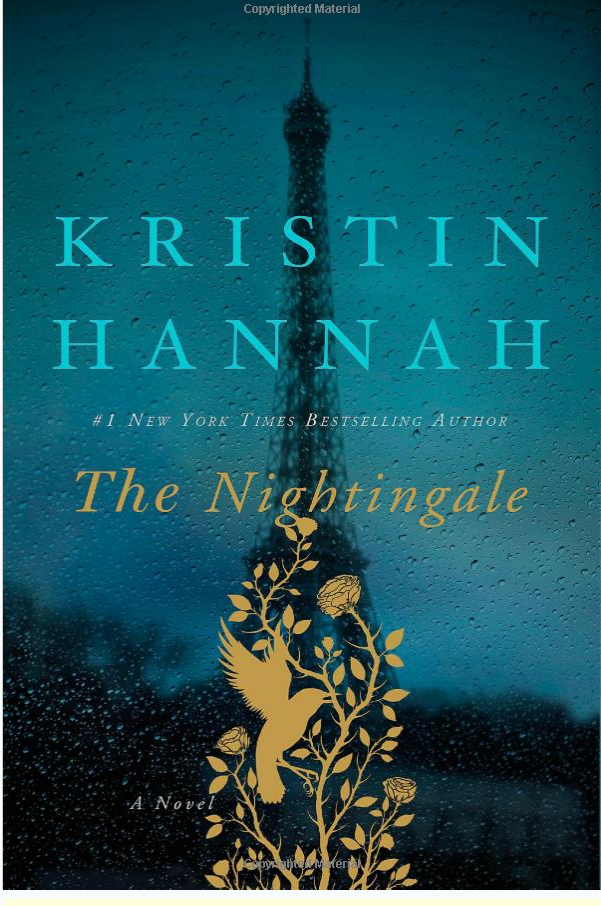 The Nightingale by Kristin Hannah
The Nightingale by Kristin Hannah
If there is any book that has greatly contributed to my understanding of the bravery and resilience of victims of Nazi, Germany it was The Diary of Anne Frank. That book was written by a teenage girl who was hiding in Amsterdam for two and half years until she and her family were betrayed and she was killed. There have been many subsequent books about World War II and the Holocaust. Yet none of them has done it better than The Nightingale by Kristin Hannah, an American novelist who was a lawyer turned writer. She did not go through any horrendous experiences as did Anne Frank and others in her own life but she obviously is a thorough researcher and a very skilled, sensitive writer who has written many successful novels prior to this number one bestseller.
Ms. Hannah has told the story how she came across the account of a Belgian woman, Andrea DeJoneg who was part of the underground resistance during World War II and guided many downed Allied pilots across the Pyrenees Mountains into Spain at the risk of her own life. Based on her research and her insight into the human psyche, Ms. Hannah was able to create the characters of this book. She recounted the acts of tremendous bravery that were shown by her protagonists and she was empathically able to describe their emotional experiences in a very believable manner.
The author focused mainly on women, particularly two sisters, Vianne and Isabelle Mauriac who were not Jewish and lived in Carriveau, a small French village that was occupied by the Nazis during World War II. The reader comes to understand the backstories of these women. Isabelle, the rebellious one, ultimately becomes a very brave woman who shepherds downed British and American pilots across the rugged mountains to safety, risking the severe repercussions which she knew would happen if she were caught.
Her sister Vianne became a heroine in her own right, hiding Jewish children when their parents were taken away by the Nazis. Her actions reawakened questions that we have asked ourselves over the years. Would we have taken in a child (or an adult) to hide or disguise them, when to have been discovered would not only endanger our lives but those of our children? There was another point in question raised by this book when at the end of the war Vianne is faced with the prospect of now having to give up her five- or six-year-old child that she has raised for the past few years when her Jewish friend was taken away to the concentration camps. Now after the war was over, relatives of the deceased Jewish parents want to take this child to America so family there can raise him. But perhaps the most challenging question that the characters in this book face is whether Vianne should tell her husband, who returned home after being a POW held by the Nazis, that the pregnancy with the child that he now feels is his child, but was actually conceived shortly before they reunited, is really the pregnancy of the brutal rape from the German officer who made her house his living quarters before he retreated with the Nazis when the Allies liberated France. Should she have told her husband the truth and should she now more than 40 years after the end of the war tell the truth to the now grownup child who is a successful surgeon and very attentive to his mother.
It is these stories as well as the vivid description of life in occupied France as well in the concentration camps, which are part of this novel that makes this book so unforgettable. It well deserves the acclaim that it is receiving and I’m sure it will be made into an unforgettable movie.
To obtain a copy of this book from Amazon, please click here
Comment » | FG - Fiction General, FH - Fiction Historical
March 17th, 2016 — 1:01pm
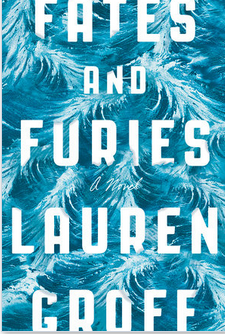 Fate and Furies by Lauren Groff
Fate and Furies by Lauren Groff
Apparently, people either love or hate this book. If I hated it maybe that would have meant it had some special emotional meaning to me, which I don’t believe was the case. I certainly did not love it.
The main protagonists are a married couple, Lotto and Mathilde. They are seemingly very much in love but as often is the case there is much more than meets the eye. Lotto was an actor turned into a successful playwright. In such a situation it would be expected that we might better understand him through his plays. We are presented with many pages of his plays which don’t really provide any great insight into him. We understand Mathilde as we learn more things about her earlier years, which gradually unfold throughout the book.
The author’s style reminds me of my early encounter with the classical writers which I did not particularly understand and was not especially moved to figure them out. Perhaps this is my shortcoming. Another way of describing the style of the author is to say it is very pretentious. There were many metaphors which where not decipherable and seemed “cutsie”. Sometimes while I was trying to figure them out, I felt I lost to some of the story line. Many authors successfully jump back and forth into different points in time, but usually there are some reference to where the particular chapter is taking place as well as the time period. This was not so with this book. I found that the time and place were not immediately obvious and therefore the readers may be trying to figure them out rather than focusing on the plot.
Perhaps the most interesting aspect of the book is the presence of “secrets” in the lives of the characters. Often these secrets when they are present contain something about their biological origin and/or secret sexual encounters. Why these secrets are so meaningful in a particular narrative is that they are often the doorway to some interesting psychological dynamics. I believe that with this book, the author would knock on the door but then not clearly deliver on this possibility. Overall, I would say that this book was not my cup of tea.
To obtain a copy of this book from Amazon, please click here
Comment » | FG - Fiction General, FR - Fiction Romance
February 13th, 2016 — 12:15am
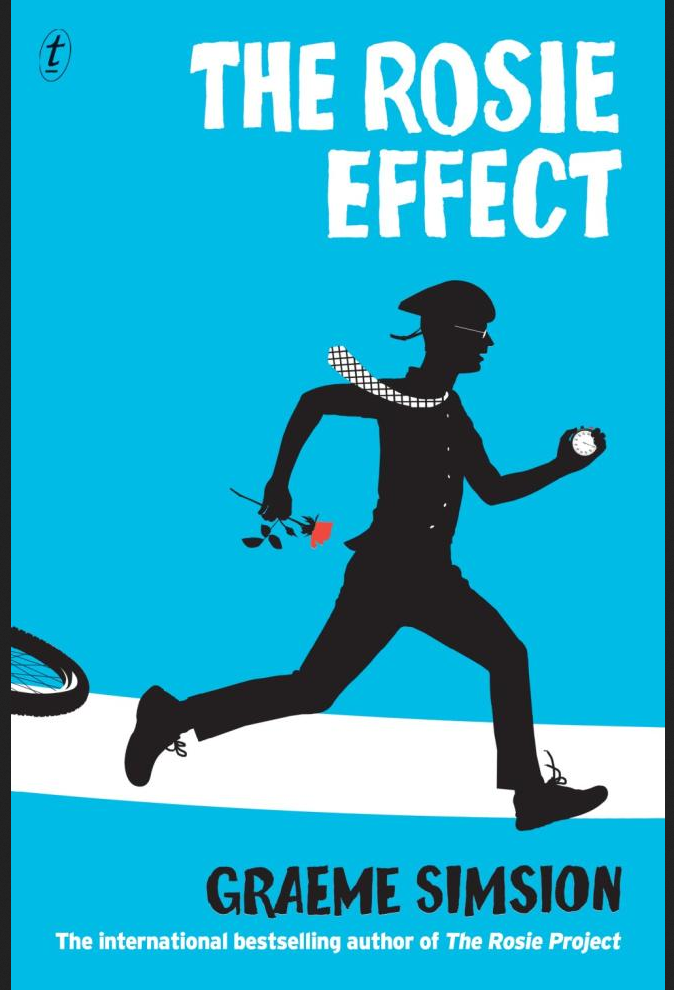 The Rosie Effect by Graeme Simsion
The Rosie Effect by Graeme Simsion
This is a sequel to The Rosie Project by the same author which in my opinion did not add anything to the first book. The main character, Don Tillman, a professor of Genetics from Australia who now is working at Columbia Medical School in New York has married Rosie, a combination PhD and medical student, who was the object of his attention in the first book. Rosie is now pregnant and Don’s reaction to this situation occupies much of the attention in this sequel. As we previously noted, I think it is fair to say that Don has a condition that might be called Asperger’s syndrome. He is obviously a very brilliant man who is extremely logical and analytical but he doesn’t quite get the meaning of feelings and emotions although he does clearly love Rosie. Don will make a spreadsheet to analyze any problem. Think Mr. Spock from Star Trek. Rosie is concerned whether Don will be able to relate to their impending child (designated at BUD for baby under development).
In an attempt to gain insight and understanding of young children, Don attempts to shoot some videos of children playing in the park. This leads him to be picked up in the park by the police for suspected pornographic intentions. This develops some interesting storylines that are clever but not brilliant enough in my opinion to become a page turner. For the most part, the author seems to be going over the same ground as in the first book. Don’s way of thinking is logical and seemingly without any psychological defenses. He says what he thinks and this allows for insightful if not amusing comments. He has a few loyal friends which allow some focus on interesting ideas about infidelity and friendship bonds between these guys. Every new character who appears in the book is described by Don by his analysis of their BMI (body mass index) which is amusing but wears thin after a while.
The first book, The Rosie Project presented an original character through whom the author could reflect on many human foibles. The author developed a base of loyal readers who might be expected to embrace the return of this character in The Rosie Effect. For me, the first book was good enough.
1 comment » | FG - Fiction General, FR - Fiction Romance, Uncategorized
January 13th, 2016 — 11:06pm
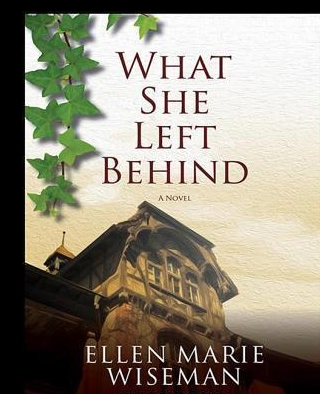 What She Left Behind
What She Left Behind
By Ellen Marie Wiseman
This book is composed of two interweaving stories. Clara, a woman who lived in the 1930s was committed to a mental institution against her will based on her wealthy father’s unhappiness about her Italian immigrant boyfriend and her refusal to marry the rich guy that her father picked out for her. The other story is about a current day teenager named Izzy who is a foster child of Peg and Harry after having lived with several previous foster parents since her mother unexplainably murdered her father. Peg is working on a museum project examining newly discovered suitcases of belongings of former patients (including those of Clara) of a now closed psychiatric facility, in order to gain some understanding of their lives. Izzy helps out with this project and finds the diary of Clara and becomes interested in her life.
Being a psychiatrist, I was initially drawn to this book with the idea that I would gain some insight into the lives and treatments of psychiatric patients living in the first half of the twentieth century. This was the case and it included vivid description of the treatment that was done at that time such as ice baths, insulin shock therapy and electroconvulsive therapy (ECT).
Although I never worked in a state hospital, when I toured them in the late 1960s, such treatments except occasional ECT under humane conditions were things of the past. As far as the possibility of someone spending most of their life committed to a mental institution based on the word of her father when she clearly did not have a mental illness, I would like to think that this would not have been possible. Certainly, in modern times from my experience someone being hospitalized against their will would have to go through a legal hearing with the patient being assigned an attorney if they don’t have one. Once in a hospital with treatment with modern-day medicines (which were not really available until the 1950s) most mental illness can be put at least in temporary remission with such treatment. Today, there would be reviews by multiple doctors with no mandate to keep the person in the hospital against their will unless they were a danger to themselves or others due to a mental illness. I would hope that nothing like Clara’s situation could occur today. Obviously, I can’t speak for every state hospital in the United States and certainly things were different in the 1930s.
There was another aspect of Clara’s case was particularly disturbing to me in that the psychiatrist in charge of her care was depicted as a mean, cruel, selfish man who was mainly responsible for Clara’s lost life. I felt it was an unfair indictment, which suggested all psychiatrists of that time might have been of the same cloth. I understand that the author has the creative choice to develop characters in whatever fashion she chooses. I probably would not be complaining if the character were a dishonest lawyer who did unsavory things in the interest of an interesting storyline but nevertheless, I felt that this book was stigmatizing my profession.
There was particular theme of this book, which also had a special interest to me. Three characters in the book were driven to try to understand their early origins. Izzy, understandably could not fathom why her beloved mother murdered her father. This ultimately led her to empathize with a schoolmate who had some parental trauma. It contributed to her mission to find Clara’s daughter who was essentially separated from her at birth, and hand over her mother’s diaries so she could know about her mother’s story. Clara’s daughter led a life of yearning to know what happened to her mother and Clara similarly went through life wanting to know what happened to her daughter. This is a variation of a theme, which I have seen played out in many people’s lives as well as in some interesting movies. Persons, sometimes separated at birth or when they are quite young often yearn to know their biological parent or parents with whom they may have had no relationship for decades. I have reflected on the psychodynamics of these issues in a psychiatry blog that I write. Therefore, I was particularly interested to see how they played out as major motivating factors in the characters in this book.
I believe the author Ellen Wiseman has created an intriguing story that will hold the interest of the reader whether or not you come from a psychiatric background.
Comment » | FG - Fiction General, FH - Fiction Historical, MHP - Mental Health/Psychiatry
 Behold the Dreamers
Behold the Dreamers

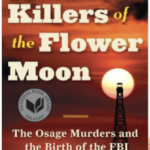
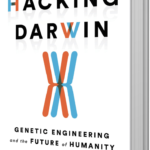
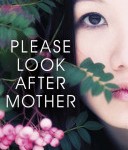
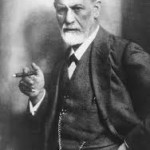
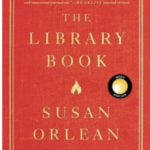
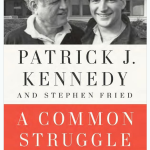







 The Storied Life of A.J. Fikry by Gabrielle Zevin
The Storied Life of A.J. Fikry by Gabrielle Zevin
 As any student of US history would know, there was not an actual “underground railroad” where slaves could ride a train and escape to the north or to the west where they could be free. Rather the term was used for men and women, black and white who risked their lives and developed an “underground” network where fleeing Blacks could be hidden and sheltered as they sought to be free of slavery and oppression that existed in this country.
As any student of US history would know, there was not an actual “underground railroad” where slaves could ride a train and escape to the north or to the west where they could be free. Rather the term was used for men and women, black and white who risked their lives and developed an “underground” network where fleeing Blacks could be hidden and sheltered as they sought to be free of slavery and oppression that existed in this country.
 The Nightingale by Kristin Hannah
The Nightingale by Kristin Hannah Fate and Furies by Lauren Groff
Fate and Furies by Lauren Groff The Rosie Effect by Graeme Simsion
The Rosie Effect by Graeme Simsion What She Left Behind
What She Left Behind